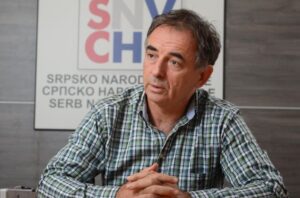The legal basis for its establishment was the Letter of Intent of the Government of the Republic of Croatia on the completion of peaceful reintegration of the area under the transitional administration of the United Nations from January 1997.
The Serb National Council (SNV) was established 25 years ago. Security Council adopted the Letter of Intent and thus its contents became part of international contractual obligations of the Republic of Croatia. Pursuant to Article 4 of the Letter of Intent, the Joint Council of Municipalities (ZVO) was established first on the territory of Osjek-Baranja and Vukovar-Srijem counties, and then SNV was established based on Article 9. That is how the Serbs in Croatia received two types of minority government – one regional and one national.

All this happened less than two years after the leadership of Krajina rejected the Z-4 Peace Plan and the Serbs who lived in the territory of Krajina fled, after which the Croatian Parliament suspended the validity of most of provisions of the then Constitutional Law on Human Rights and Freedoms and the Rights of ethnic and national communities or minorities. All provisions concerning political-territorial autonomy were suspended: the proportional representation of the two autonomous districts of Knin and Glina. By suspending the provisions on proportional representation, which were guaranteed by the Constitutional Law to minorities whose share in the total population of the Republic of Croatia is at least eight percent, the Parliament annulled the results of the 1991 population census, which were supposed to be valid until the new census in 2001.
In addition, until the adoption of the Letter of Intent, Serb refugees were treated as optants, so they were only allowed to return individually. If it was not destroyed, their property was declared the property of the Republic of Croatia and given to others for use, and those who were fit for military service were either accused of armed rebellion or proceedings against war crimes were initiated against (a significant number of) them. The largest number of refugees did not have valid Croatian documents.
This is how SNV and ZVO, which was first chaired by Miloš Vojnović, as well as the Independent Democratic Serb Party (SDSS), which was also established in 1997 with Dr Vojislav Stanimirović as its President, were established in circumstances that contained two extremes within them – all the weight of war on one side, and all the weight of peace on the other.
Creation of the National Trust Restoration Committee, led by Vesna Šakre Ožbolt, Ivica Vrkić and Vojislav Stanimirović, as well as the United Nations Transitional Authority in Eastern Slavonia, Baranja and Western Sirmium (UNTAES), with the Office of the UN High Commissioner for Refugees (UNHCR) and later, after the end of the UNTAES mission, the mission of the Organization for Security and Co-operation in Europe (OSCE), significantly helped bring relief from the war and facilitate the path to peace.
Relief from the war included the restoration of inter-ethnic trust, the issuance of certificates of Croatian citizenship and personal documents, the integration of police officers, judges, clerks, doctors, teachers, professors and employees in public companies, adoption of the law on general amnesty and on the convalidation of documents issued during the Krajina period, the return of property to displaced and the refugees, rebuilding houses that were destroyed during and after the war, and ensuring that only those who committed crimes are brought before justice, and that such trials are not part of a campaign to deter return and produce collective guilt.

Organizing SNV, ZVO and SDSS – or better yet, organizing three segments of the Serb community (those who lived in the cities, those who were reintegrated during peaceful reintegration and those who are returning or want to return) into unique organizational entities, in accordance with international agreements such as the Erdut Agreement and the Letter of Intent, the Constitution and laws, was the first necessary step towards the restoration of political subjectivity of Serbs in Croatia. The restoration of political subjectivity was the second necessary step of the internal cohesion of the community and its political participation in representative and other government bodies. This process has been going on for 25 years, maintaining existing ones and incorporating new ones.
Peaceful reintegration and the policy of building international trust, then the political changes that followed after the year 2000 and after 2003, with the main course of moving away from the anti-minority politics and moving towards the politics of European integrations, represented a continuously positive context for the organization and operation of SNV, ZVO and SDSS. This process was faster than the relief from the burden of war.
The restoration of inter-ethnic, Croatian-Serbian trust, together with the restoration of political subjectivity of the Serb community and the orientation of the Republic of Croatia towards European integrations, encouraged the members of the Serb community and provided an opportunity to affirm its political activity, as well as to strengthen its political participation at the local, regional and state level. The most symbolically powerful act that contributed to this and created space for pro-minority politics in Croatia was the agreement on coalition cooperation and the arrival of Prime Minister Ivo Sanader to the traditional Christmas reception of the Serb National Council on January 6, 2004, when he greeted the gathered group with the traditional words of the Orthodox faithful: “Mir Božji, Hristos se rodi!” (Peace of God, Christ is born!)
The echo of this greeting resonated until 2012. That’s when the anti-minority politics and politics directed against the left-liberal government and the president started to return. The anti-Cyrillic campaign, first in Vukovar, with echoes throughout Croatia, drowned out that echo, and Croatia, which had just been admitted to the membership of the European Union, turned into a country that cancelled everything that led it to that membership. SNV, ZVO and SDSS, as well as the community they represented, acted under the threat of abolishing political subjectivity and political participation which they renewed – from the Peace Train of President Franjo Tuđman to the anti-Cyrillic riots in Vukovar and the anti-government riots in Zagreb.
Since then, most things have either slowed down or came to a halt – the reconstruction of family homes and housing care for former occupancy-right holders, the reconstruction of communal infrastructure (electricity, water, roads) in returnee communities, the trials for war crimes committed against Serbs and investment in capacities in municipalities where members of national minorities live, and in particular, investment in the economic development of returnee areas and areas where members of national minorities live has been stopped. The only thing that accelerated and got stronger was historical revisionism and hate speech. Especially towards anti-fascism and towards Serbs.
From 2016-2017, the heritage of peaceful reintegration, European integrations and political subjectivity and political participation of the Serb community began to be restored. And it continues to this day. SNV, ZVO and SDSS together and with the support of the Government of Prime Minister Andrej Plenković, unblock the reconstruction of family houses and communal infrastructure, and especially strengthen the capacities of municipalities and the availability of funds for the development of areas where members of national minorities live. Historical revisionism and hate speech are being silenced. Prerequisites are being created for the construction of infrastructure for minority institutions and their programs in the field of culture, education and sports. In one word, from those years until today, the pro-minority policy has been renewed and strengthened with the significant contribution and participation of SNV, ZVO, SDSS and numerous other Serbian organizations.
On December 28, 2020, and the next day, a strong earthquake hit the Banija area and its neighboring areas. This economically, demographically, residentially and communally devastated area was destroyed to such an extent that the words of one of its residents, whom I met the second day after the earthquake, still resonate with me today: “There is no more Banija!”
Many came to help then and they faced the circumstances of how people were living that were not known to everyone until then. SNV joined that crowd with numerous donors from Serbia, Republika Srpska (BiH) and other countries. Together with the Serbian Orthodox Church, SNV donated over 170 containers, large quantities of construction materials, clothes and food. Representatives of the SNV and SDSS from different regions organized themselves to provide several months of solidarity. The Government of Republika Srpska (BiH) donated ten durable and high-quality prefabricated houses through SNV. And that won’t be all. The experience of helping the first returnees and returnee areas created within the SNV the moral and organizational capacity for that kind of help.
The status of SNV and ZVO as minority governments established based on international contracts, the Erdut Agreement and the Letter of Intent is still waiting for an adequate and permanent solution. The same applies to the application of the Constitutional Law on the Rights of National Minorities and the Law on Minority Education and the Official Use of the Cyrillic Alphabet and the Language Expression of Serbs in Croatia. We are also waiting for solutions for education against historical revisionism and hate speech, as well as solutions for their social sanctioning. We say that we are waiting for them, and actually we think of them as our first next priorities.
SNV went through seven electoral cycles since its establishment until today. The first two were conducted according to the Articles of Association, and the remaining five were conducted in minority elections in accordance with the Constitutional Law on the Rights of National Minorities from 2002 and the new SNV Articles of Association. In those seven cycles, SNV held almost seven thousand council mandates, and today it holds close to 1,750 mandates at the municipal, city and county levels. On average, around 150 municipal, city and county councils of the Serb national minority have been included in SNV per cycle since 2003, since elections are being held according to the provisions of the Constitutional Law. During all this time, the councils of the Serb national minority worked under different conditions – from complete non-recognition by local and regional self-government units, which means no space for work, financial support and inclusion in the work of representative bodies, to full compliance with the provisions of the Constitutional Law. To all the holders of those mandates, especially the Council presidents, members of SNV assemblies and its presidencies, I express my gratitude at this place and on this occasion. I express the same gratitude to the colleagues in the Central Office of SNV and those who are employed in SNV’s special programs, such as media, research, humanitarian or development programs, and their external or field associates. We certainly owe our gratitude to the original founders of SNV, such as ZVO and members of the Alliance of Serb Organizations, SDSS, SKD Prosvjeta, Serbian Democratic Forum, Community of Serbs of Rijeka, Community of Serbs of Istria, Baranja Democratic Forum, representatives of the Serbian Orthodox Church and prominent individuals who transferred their social reputation to SNV. We owe the same debt of gratitude to the members of SNV Council, which acts as a coordinating body of Serb organizations in Croatia and it is a place for discussing program topics and program goals, both of SNV and the entire community. We also owe thanks to the organizations that were created under SNV’s wing: the Youth Network of Serbs in Croatia, which transformed into the new, renewed SDF, and the Sports and Recreational Society of Serbs in Croatia.
Milorad Pupovac, introduction for monograph “SNV/CHB 25”, publisher: Serb National Council, 2022, Editor Nikola Bajto